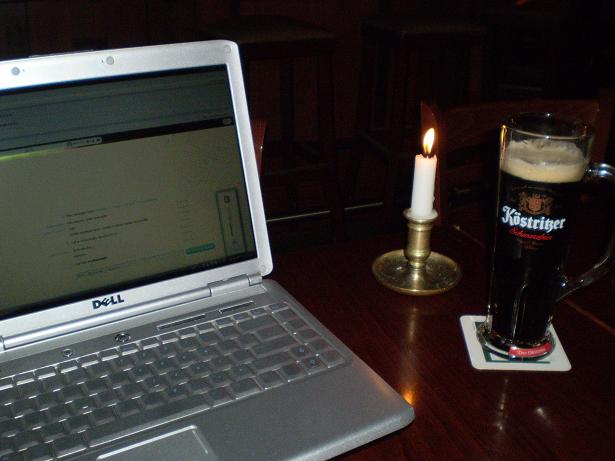Stranger in an Even Stranger Land
Nothing to write home about |
Last Word
| robert |
Saturday, 30 May 2009 - 18:05PM
Home time!
If I had to sum up Berlin in a single word, I think it would be "Bicycle". Like guns in the USA - everyone has one, and they're not afraid to use it.
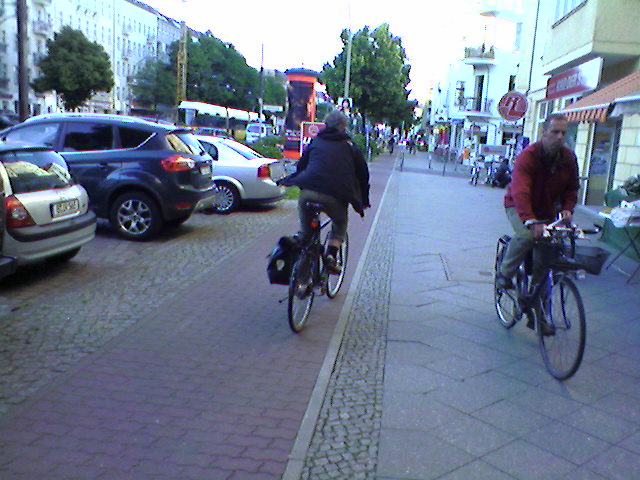
The red zone on the left is what Germans call a 'bicycle lane'
(you have to ask them the name because it's not actually labelled - I guess natives think it's obvious)
but I call it the 'death zone' because of the certainty of pedestrian mortality should one stray into it
On the right you can see the 'pedestrian footpath',
where the probability of death by bicycle is reduced from 'certain' to only 'quite likely'
If I had to sum up my trip in one word, a re-reading of the blog suggests that the word should be "sleep-in". These ranged from 'quite pleasant' (the ones followed by a slow brunch and a relaxing wander) to 'quite stressful' (in particular the one that was followed by me arriving late to the presentation I was giving).
If I had to name the German word I've used the most while here, the re-reading suggests "milchkaffee".
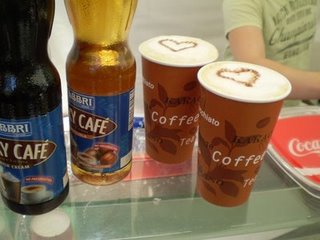
If I were forced find the silver lining of the 15 hour flight I have ahead, I might have to reverse the conchordian "two minutes in heaven is better than one minute in heaven": 15 hours in a plane is probably better than 3 days in a zeppelin.
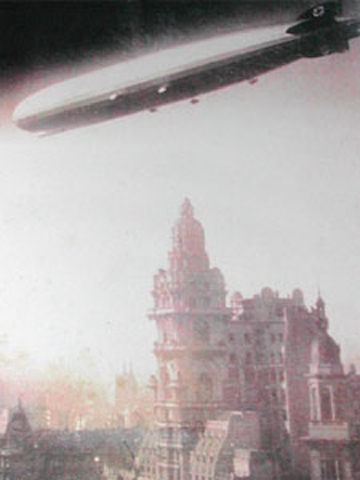
It's been interesting to visit Berlin, even though I'd never really had a big desire to come here before. With Hitler's Germany being centred here, and being the site where he died as the Russian army burnt the city down, it being the most intimate and most iconic border between capitalist West and communist East and so a stage for the freezing into the Cold War to play out on, with the most tangible manifestation of the 'iron curtain', the fall of which becoming the symbol for the thaw of East/West relations, Berlin has been a focus point for much of the important world history of the twentieth century.
In particular it's interesting to compare and contrast attitude to the former 'evil' regime here (the DDR) and that in Argentina (the military dictatorship), both of which ended a similar amount of time ago. There's no question that in both cases the people longed and struggled for many years to gain freedom from oppression. However, in Berlin (and I get the impression this is true in Germany in general) there's a certain touch of nostalgia that you don't find in Argentina.
For example, in Berlin there's a DDR Musuem. Admittedly it's a tiny, quaint, subterranean museumette squatting on the bank of the Spree peering enviously at its much more grandiose counterparts across the river on Museum Island. But inside it, I was expecting to find documentation of the horrors committed by the Stasi, accounts of kidnapping, torture, and execution of dissidents and brutal repression of the people; the kind of thing you'd find in the museum of the ESMA in Buenos Aires.
It's nothing like that. There are accounts of the Stasi there, doing wiretaps and bugging, recruiting spies. According to this museum, there was no particularly bad consequences for refusing the recruitment process, which does stretch the bounds of credibility. But in Argentina, you could barely get away with making a claim like that, whether or not anybody believed you - and much less in a museum exhibit. But the contrast really lies in the vibe of the museum - it's full of kitschy artifacts of the DDR period - clothing and fashion magazines, childrens toys, a Trabi that you can get into and 'drive', a replica apartment, accounts of daily life as a child, a student, a worker, salary comparisons, TV and radio shows. The fell is one of nostalgia - it's not "look at all the terrible things they made us suffer", it's more "look at all this so-tacky-it's-cool stuff we had/did" - more like a kiwiana museum in New Zealand. It's a museum more for Berliners than for tourists.
Even if you take the DDR musuem as being a last gasp of propaganda from the age it documents, there are other things that mark a contrast. There's also a lot of nostalgia felt for the Trabants produced by the East - there's a tour company set up that gives you the 'drive around Berlin in a real-live Trabi' experience. Not only is there no evident equivalent endearment felt for VW Beetles (perhaps it's the only place in the world where Beetles aren't endearing), but I haven't seen a single Beetle outside a musuem here.
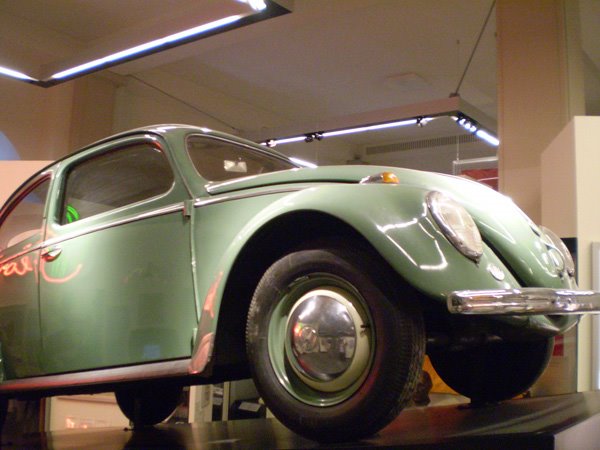
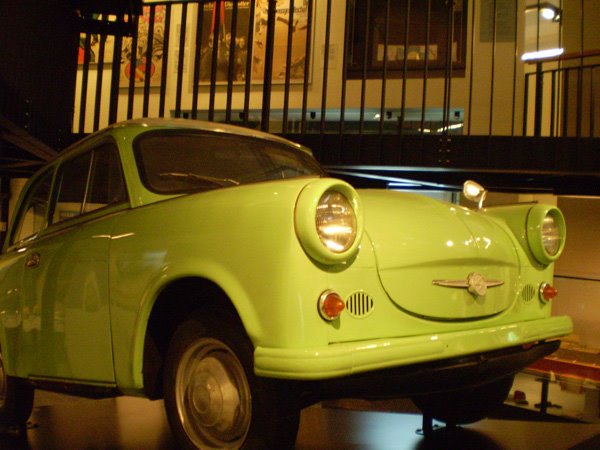
There's also the 'Save the Ampelmann' campaign, whose aim is to re-establish the use of the 'Ampelmann' pedestrian-crossing traffic lights in formerely-East Berlin and Germany at large. These had boy-scouty looking stylistic figures for 'cross' and 'wait', and the design has now been privately trade-marked and is being merchanised and marketed to death here. But it's not just a capitalistic advantage-taking of a former Eastern icon (like the selling of the rubble of the fallen wall to tourists), as there's genuine nostalgia felt by the locals, which is what provides fuel for the merchandising.
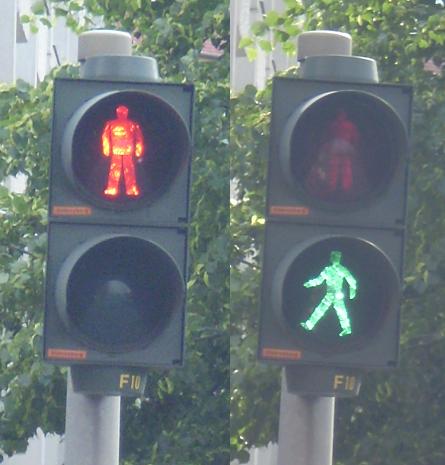
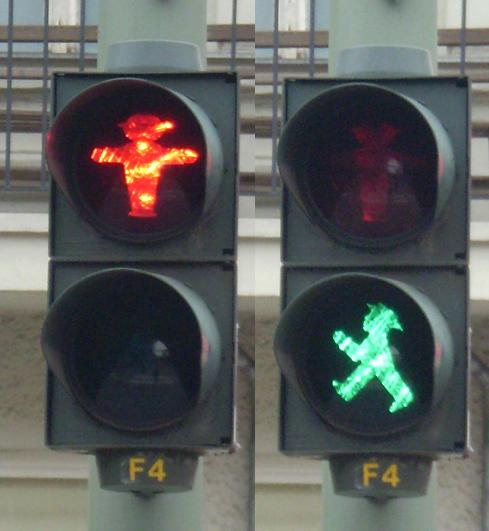
In Argentina, on the other hand, the only automotive memory from the dictatorship seems to be the spectre of Ford Falcons - this is not nostalgia: these were the cars used by the military authorities when kidnapping 'terrorist suspects' (in fact in 2006 the Ford Motor Company was charged with repression of its workers in cooperation with the dictatorship). There's no regime-associated icon like the Ampelmann that harks back to the 'days of youth' in the minds of Argentinians. You can hear nostalgic reminiscences of the days of the dictatorship in the mouths of taxi drivers - of the "there wasn't so much rubbish/drunkenness/insecurity/lawlessness/violence back then" variety. But I'm almost certain that this is for polemic effect rather than a genuine expression of yearning for the 'good old days' - it's a way to make conversation; a porteño taxi driver enjoys being provocative, whether it's a native saying that the dictatorship was good or an immigrant saying all Argentinians are lazy, decadent snobs. They say these things to get a reaction and generate a discussion (in fact, a discusión).
It's also been interesting to remember what it's like arriving to live in a country where you don't speak the language. I had much more Spanish arriving in Buenos Aires than I did arriving in Berlin (or do now leaving there), but the situation of not understanding my surroundings was the same. Not just being surrounded by gibberish, but also having to figure out the local way of going about life - what supermarkets are like, how cafes work, how you pay for things (in Berlin you have to use the little tray on the counter - no touching the shop assistent please!), how to tip (round up your bill, don't leave money on the table), how you greet people (no kissing here). This is all part of the adventure, but I'd forgotten how isolating and exhausting it is - there's a puzzle at every turn and progress is slow as there's so much to learn. And you have to be ok with coming across as really really stupid, because you do so many dumb-ass things.
Most travellers to Buenos Aires at one point or other lose it and have a tantrum about things not being like home - I've seen this happen to even seasoned travellers. I don't think I suffered that here, but I definitely had moments where it was all to much and all I wanted was to curl up in bed for 24 hours. Lucky Ceci arrived when she did to inject some fresh perspective to make Berlin exciting again - I was just nose-diving into survive-with-minimal-interaction mode.
So I've done some last chocolate shopping, done final blogging, emailing, and skyping. Off to my dirigible tomorrow, will be back in BA in three days. I miss my own bed!
